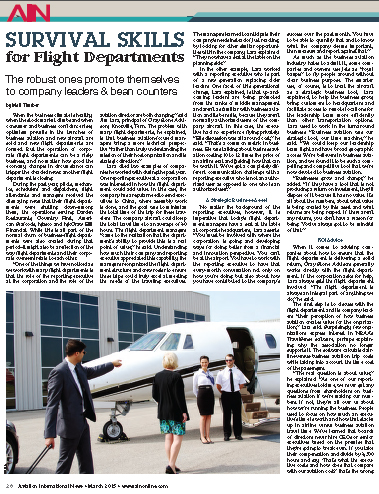Below is an excerpt from an article by Matt Thurber published in the March 2015 issue of Aviation International News. Click here to read and print the PDF.
Survival Skills for Flight Departments: The Robust Ones Promote Themselves to Company Leadership
When the business climate is healthy, when the stock market climbs and when consumer and business confidence rises, optimism prevails in the trenches of business aviation and new aircraft are sold and new flight departments are formed.
But the operation of corporate flight departments can be a risky business, and no matter how good the economy, changes in circumstance can trigger the dreaded news: another flight department is closing.
During the past year, pilots, mechanics, schedulers and dispatchers, flight attendants and managers received the dismaying news that their flight departments were shutting down–among them, the operations serving Darden Restaurants, Coventry First, American Seafoods, Masco and McGraw Hill Financial. While this is all part of the normal churn of business–flight departments were also created during that period–it might also be a reflection of the way flight departments and their corporate overseers relate to each other.
“One of the things we have noticed as we work with many flight departments is that the role of the reporting executive at the corporation and the role of the aviation director are both changing,” said Jim Lara, principal of Gray Stone Advisors, Knoxville, Tenn.
The problem with many flight departments, he explained, is that business aviation-focused managers bring a more technical perspective “rather than truly understanding the mission of their host organization and its strategic direction.”
Lara cited two examples of companies he worked with during the past year. One reporting executive at a corporation was interested in how the flight department could add value. In this case, the company has a regular need to send executives to China, where assembly work is done, and the goal was to minimize the total time of the trip for these travelers. The company aircraft could keep the total travel time to an average of 30 hours. The flight department managers “came to the realization that the department’s ability to provide this is a real point of value,” he said.
Understanding how much their company and reporting executive appreciated this capability, the managers reorganized the flight department structure and crew roster to ensure these trips could truly excel at meeting the needs of the traveling executives. The managers learned to anticipate their company’s needs instead of just reacting, by looking for other similar opportunities within the company, Lara explained. “They now have a seat at the table on the planning side.”

Download and print the full article.
Read the full article here at Aviation International News.
Recommendations for aviation managers
- Get a high-quality education with a business focus.
- Be a life-long learner. You have to develop yourself relentlessly to stay relevant and contemporary.
- Find a mentor at company headquarters to help you develop your career plan and build your skills.
- Volunteer for special assignments to show you’re willing to learn and demonstrate skills beyond the aviation department and get more exposure inside the corporation.
- Keep networking within and beyond aviation and become involved in the fabric of your community, which will help you develop leadership skills in new areas.
- Summon the courage to have a conversation. While this could bring negative consequences, you have the best interests of the flight department and the jobs of its employees at heart.
